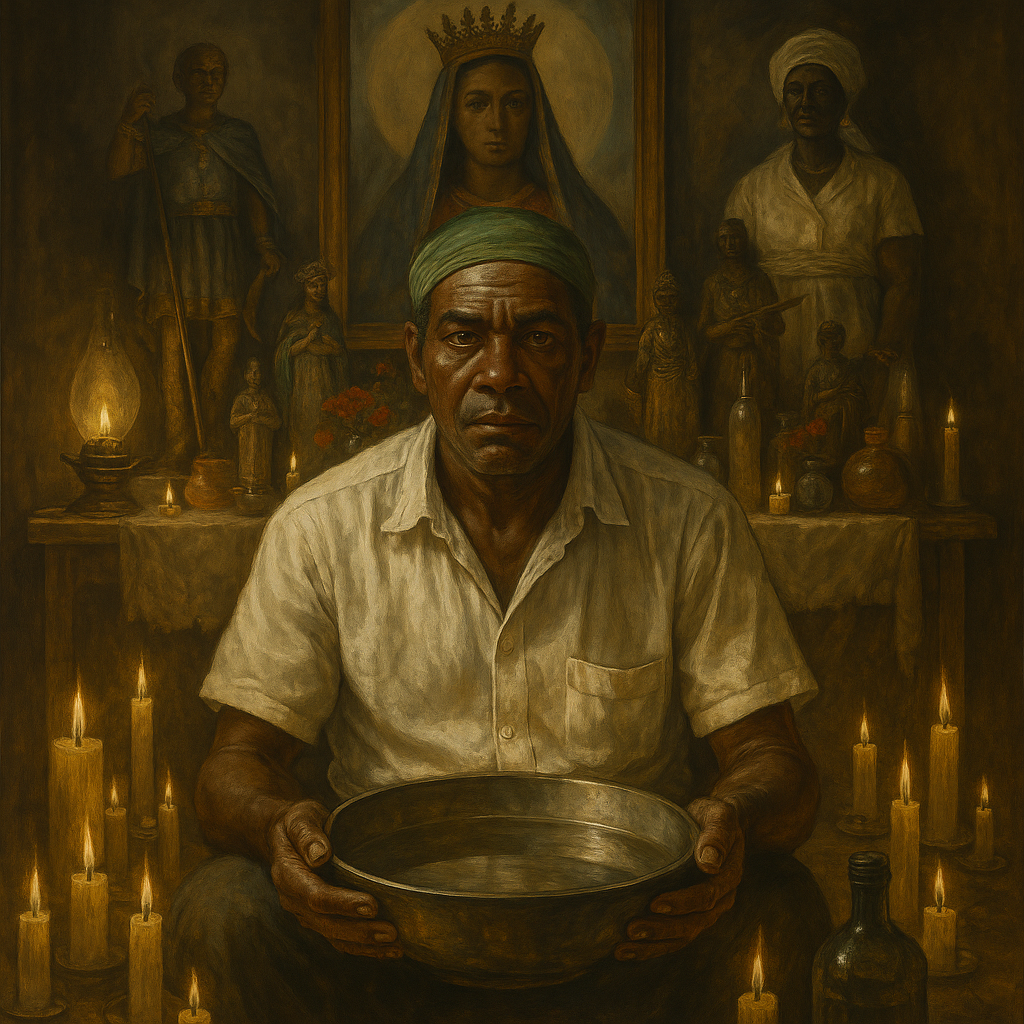
What Are the 21 Divisions? A Deep Look at Dominican Vodou Lineages
Many spiritual seekers have heard the term “21 Divisions” in reference to Dominican Vodou, but few truly understand its origin, depth, and structure. At Ejiogbe Institute, we believe in honoring the full legacy of Afro-Caribbean spirituality by returning to the roots. This blog post unpacks the historical and spiritual truth about the 21 Divisions — not as a separate religion, but as one of the living lineages of Vodou deeply rooted in both Haiti and the Dominican Republic.
The Historical Roots of Dominican Vodou
- One Island, Shared Legacy: The island of Hispaniola (modern-day Haiti and the Dominican Republic) was once unified. Vodou developed across the island, shaped by African spiritual systems brought through the transatlantic slave trade.
- Mutual Aid Societies (Cofradías): Early African communities formed spiritual brotherhoods, often dedicated to Catholic saints, which became vessels for ancestral worship.
- African Lineages: Dominant ethnic groups included Congolese, Dahomean, Yoruba (called "Nago"), Igbo, Senegalese, and others. Each brought distinct spiritual practices that merged over time.
What Are the “21 Divisions”?
- The “21” is symbolic. There are more than 21 Loa. The number reflects spiritual completeness, not a fixed count.
- The Divisions (or “Nations”) are groupings of Loa by their spiritual origin:
- Rada (Daomean, sweet or calm spirits)
- Petwo (Congolese, fiery or warrior spirits)
- Gede (ancestral and death-related spirits)
- Some include Nago, Igbo, or Gete Vodu as separate divisions or sub-divisions.
Dominican Vodou and Haitian Vodou: One Tradition, Many Names
- There is no hard boundary between Dominican and Haitian Vodou. They are regional expressions of the same ancestral tradition.
- The name “21 Divisions” is more commonly used in the Dominican Republic and northern Haiti.
- The southern Haitian tradition of Asogwe (temple-based Vodou) is the most well-known globally, but other styles like Chacha, Kwako, and Makout are widespread.
- Initiation structures differ: Baptism (Bautizo), Head Washing (Refresco de Cabeza), and Placation Ceremonies (Aplazamiento) are used in the 21 Divisions lineages.
Understanding Initiation in the 21 Divisions
There are several forms of spiritual alignment and initiation:
- Refresco de Cabeza (Head Refreshment): Spiritual alignment ritual to harmonize the practitioner with their guiding Loa.
- Aplazamiento: A ceremony to calm or appease the spirits, especially for those who mount frequently but don't want full responsibility.
- Bautizo (Baptism): Full initiation that involves a multi-day ceremony and includes oaths, spiritual transmissions, and responsibilities.
Initiation grants:
- Deeper spiritual connection
- Structured training
- Ritual authority
- The ability to serve the community
Frequently Asked Questions (FAQ)
Q: Are the 21 Divisions different from Haitian Vodou?
A: No. The 21 Divisions is a regional name for a lineage of Vodou practiced in northern Haiti and the Dominican Republic.
Q: Can anyone practice Dominican Vodou without initiation?
A: Yes. Many people serve the spirits inherited by their family without formal initiation. Initiation becomes necessary for those who wish to lead, teach, or carry heavier responsibilities.
Q: Why is it called “21 Divisions”?
A: It’s a symbolic name referring to spiritual completeness. There are far more than 21 spirits.
Q: What’s the difference between Rada, Petwo, and Gede?
A: These are nations of Loa: Rada are calmer, ancestral spirits; Petwo are fiery and warrior-like; Gede are spirits of the dead.
Q: Can someone be mounted by a Loa without being initiated?
A: Yes. Possession is often a sign of spiritual calling and may prompt the need for ceremony or baptism.
Q: Is there one “official” form of Vodou?
A: No. There are multiple lineages—Asogwe, Chacha, 21 Divisions, and others. Each is valid and rooted in specific communities and histories.
If you're drawn to the Loa, if you've been dreaming, hearing, or feeling the call — don’t ignore it. You might be one of the chosen. Whether you’re seeking clarity, confirmation, or initiation, Ejiogbe Institute is here to guide you with integrity and respect for tradition.
👉 Schedule a Reading or Consultation
Learn your lineage. Honor your spirits. Serve with knowledge.
